By Dave Kindy, Wicked Local PLYMOUTH – Remembrance Day was a washout outside last Friday but it was poignant moment of reflection inside at Pilgrim Hall Museum. Forced to move indoors […]
Read MoreJoin us for the Episode Seven of our Plymouth 400 CONVERSATIONS series on PACTV (Plymouth Area Community Television)! The program will air on April 29th and May 6th at 7:30PM on Comcast channel 13 and Verizon channel 43 in the towns of Plymouth, Duxbury, Kingston, and Pembroke. After the program airs, you can view the episode here.
Our guests for Episode 7 are Steven Peters and Robert Peters.
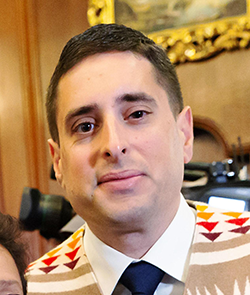
Steven Peters is responsible for the development of historical exhibits, content and interactive attractions that challenge historical myths. His work can be seen on Newbury Street in Boston, the Box Museum in Plymouth England and the Pilgrim Hall Museum and Provincetown Museum in Massachusetts. In addition, he provided the creative direction for the traveling exhibit “Our” Story: 400 Years of Wampanoag History, an exhibit that has been featured in Time Magazine, New York Times, BBC Radio and many other national and international publications for its ability to correct historical inaccuracies.
Steven holds a B.S. in marketing and communications from Bridgewater State University and is a graduate from the Community Leadership Institute.
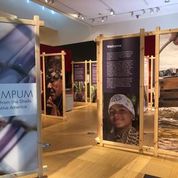
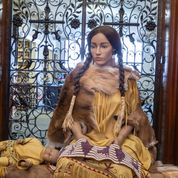
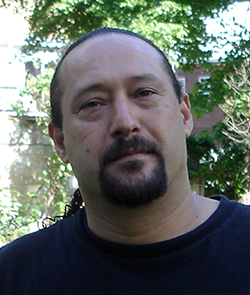
Robert Peters is a Mashpee Wampanoag artist, writer and poet. He is the artist/author of “Thirteen Moons,” a 2020 calendar featuring thirteen acrylic paintings accompanied by poetry, essays and thoughts – written over a span of twenty years. “Thirteen Moons” was created to promote understanding and healing among indigenous people everywhere.
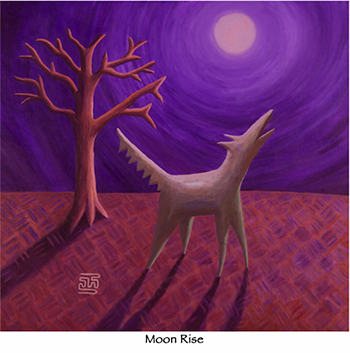
In 2009, Robert published his first book “Da Goodie Monsta”, an illustrated children’s book based on a dream his son had when he was three years old. The story depicts a monster that is part lion, part bird and part dragon wearing roller skates. “Da Goodie Monsta” chases away nightmares.
Robert is a fire keeper and organized the Annual Wampanoag Medicine Fire from 2001 to 2010. The Medicine Fire traveled between different Native communities. It was hosted in Mashpee, Assonet, Hassanainsett (Nipmuck Nation) and Boston (North American Indian Center Of Boston).
Robert was the director of the “Menz Wetu Project.” This project consisted of five instructors and 23 Mashpee Wampanoag tribal youth who constructed a 32’ foot longhouse on their reservation in Mashpee. The longhouse is still in use.
Today Robert continues writing, painting, and working with people. He is a fire keeper and a keeper of oral traditions. He is currently working with the Massachusetts Bureau of Substance Abuse and Services developing Native youth drug prevention booklets and curriculum. To date two booklets are in use, “Coming Home” and “Stories and Poems For Eastern Native Families.
Join us for the Episode Seven of our Plymouth 400 CONVERSATIONS series on PACTV (Plymouth Area Community Television)! The program will air on April 29th and May 6th at 7:30PM on Comcast channel 13 and Verizon channel 43 in the towns of Plymouth, Duxbury, Kingston, and Pembroke. After the program airs, you can view the episode here.
Our guests for Episode 7 are Steven Peters and Robert Peters.

Steven Peters is responsible for the development of historical exhibits, content and interactive attractions that challenge historical myths. His work can be seen on Newbury Street in Boston, the Box Museum in Plymouth England and the Pilgrim Hall Museum and Provincetown Museum in Massachusetts. In addition, he provided the creative direction for the traveling exhibit “Our” Story: 400 Years of Wampanoag History, an exhibit that has been featured in Time Magazine, New York Times, BBC Radio and many other national and international publications for its ability to correct historical inaccuracies.
Steven holds a B.S. in marketing and communications from Bridgewater State University and is a graduate from the Community Leadership Institute.



Robert Peters is a Mashpee Wampanoag artist, writer and poet. He is the artist/author of “Thirteen Moons,” a 2020 calendar featuring thirteen acrylic paintings accompanied by poetry, essays and thoughts – written over a span of twenty years. “Thirteen Moons” was created to promote understanding and healing among indigenous people everywhere.

In 2009, Robert published his first book “Da Goodie Monsta”, an illustrated children’s book based on a dream his son had when he was three years old. The story depicts a monster that is part lion, part bird and part dragon wearing roller skates. “Da Goodie Monsta” chases away nightmares.
Robert is a fire keeper and organized the Annual Wampanoag Medicine Fire from 2001 to 2010. The Medicine Fire traveled between different Native communities. It was hosted in Mashpee, Assonet, Hassanainsett (Nipmuck Nation) and Boston (North American Indian Center Of Boston).
Robert was the director of the “Menz Wetu Project.” This project consisted of five instructors and 23 Mashpee Wampanoag tribal youth who constructed a 32’ foot longhouse on their reservation in Mashpee. The longhouse is still in use.
Today Robert continues writing, painting, and working with people. He is a fire keeper and a keeper of oral traditions. He is currently working with the Massachusetts Bureau of Substance Abuse and Services developing Native youth drug prevention booklets and curriculum. To date two booklets are in use, “Coming Home” and “Stories and Poems For Eastern Native Families.
Before Plymouth Colony and the Pilgrims, There was Patuxet
By Virginia Williams, Atlas Obscura Slavery, plague, and territorial conflict likely made the Europeans’ arrival on Wampanoag land possible. Click here to read the entire article.
Read MoreA Fresh Take on the Mayflower’s History
By Tanya Mohn, The New York Times This article is part of our latest Museums special section, which focuses on the intersection of art and politics. Paula Peters remembers the last […]
Read MoreTHIS EVENT WILL BE RESCHEDULED. Please check the Pilgrim Hall Museum website for updates.
The Plymouth Tapestry is a heroically-scaled embroidered tapestry that tells the story of Plymouth, Massachusetts through handcrafted needlework. Commissioned by Pilgrim Hall Museum in honor of the 400th anniversary of Plymouth Colony’s founding, the Plymouth Tapestry portrays the experiences of the English settlers who arrived on the Mayflower and the Wampanoag families who inhabited the region for millennia before their arrival.
The multimedia-thread-on-linen embroidery will be comprised of twenty individual six-foot-long panels, created by volunteer embroiderers. On April 16th at a gala reception, the first series of completed panels will be unveiled, including scenes of the Wampanoag village of Patuxcet, and the rise of the Separatist Pilgrim congregation in northern England. Selected panels will be displayed from April 17th through December 30, 2020. The Tapestry will be shown in its entirety on completion, expected in the Fall of 2021.
THIS EXHIBIT HAS BEEN POSTPONED UNTIL PILGRIM HALL MUSEUM REOPENS. Please visit their website for updates.
A special exhibition, pathFOUNDERS: Women of Plymouth, on display through May 10th, presents original objects reflecting four centuries of women’s experience and multimedia presentations giving voice to women of early Plymouth Colony, including Susanna White Winslow, Awashonks, Elinor Billington, Priscilla Mullins Alden, Hobbamock’s wife, and Mary Chilton Winslow.
Pilgrim Hall Museum’s 2019 exhibition resets the 400-year story of Plymouth with a focus on the lives and legacies of pathfounding women. Makers, nurturers, leaders, and survivors, they made history, though their stories are often untold.
Who were the women who shaped Plymouth? The women of the Mayflower, immigrants to a new land, keepers of family and tradition, risk-takers, and founders of a colony. The Wampanoag women present in their own homeland, growers, culture bearers, and clan leaders who became upholders of a way of life threatened by incursion. The women of every era since in Plymouth’s ongoing 400-year history who impacted family and community through their ideas, actions, and example.
This exhibition includes Women 100 – A Digital Archive of Local Women’s History, Activism, & Experience, created by Pilgrim Hall Museum to document a century of local women, in honor of the 100th anniversary of the 19th amendment granting American women the right to vote. Photographs, film, and oral histories highlight women who impacted their communities through arts and education, family, activism, enterprise, and public service.
THIS EXHIBIT HAS BEEN POSTPONED UNTIL PILGRIM HALL MUSEUM REOPENS. Please visit their website for updates.
A special exhibition, pathFOUNDERS: Women of Plymouth, on display through May 10th, presents original objects reflecting four centuries of women’s experience and multimedia presentations giving voice to women of early Plymouth Colony, including Susanna White Winslow, Awashonks, Elinor Billington, Priscilla Mullins Alden, Hobbamock’s wife, and Mary Chilton Winslow.
Pilgrim Hall Museum’s 2019 exhibition resets the 400-year story of Plymouth with a focus on the lives and legacies of pathfounding women. Makers, nurturers, leaders, and survivors, they made history, though their stories are often untold.
Who were the women who shaped Plymouth? The women of the Mayflower, immigrants to a new land, keepers of family and tradition, risk-takers, and founders of a colony. The Wampanoag women present in their own homeland, growers, culture bearers, and clan leaders who became upholders of a way of life threatened by incursion. The women of every era since in Plymouth’s ongoing 400-year history who impacted family and community through their ideas, actions, and example.
This exhibition includes Women 100 – A Digital Archive of Local Women’s History, Activism, & Experience, created by Pilgrim Hall Museum to document a century of local women, in honor of the 100th anniversary of the 19th amendment granting American women the right to vote. Photographs, film, and oral histories highlight women who impacted their communities through arts and education, family, activism, enterprise, and public service.
THIS EXHIBIT HAS BEEN POSTPONED UNTIL PILGRIM HALL MUSEUM REOPENS. Please visit their website for updates.
A special exhibition, pathFOUNDERS: Women of Plymouth, on display through May 10th, presents original objects reflecting four centuries of women’s experience and multimedia presentations giving voice to women of early Plymouth Colony, including Susanna White Winslow, Awashonks, Elinor Billington, Priscilla Mullins Alden, Hobbamock’s wife, and Mary Chilton Winslow.
Pilgrim Hall Museum’s 2019 exhibition resets the 400-year story of Plymouth with a focus on the lives and legacies of pathfounding women. Makers, nurturers, leaders, and survivors, they made history, though their stories are often untold.
Who were the women who shaped Plymouth? The women of the Mayflower, immigrants to a new land, keepers of family and tradition, risk-takers, and founders of a colony. The Wampanoag women present in their own homeland, growers, culture bearers, and clan leaders who became upholders of a way of life threatened by incursion. The women of every era since in Plymouth’s ongoing 400-year history who impacted family and community through their ideas, actions, and example.
This exhibition includes Women 100 – A Digital Archive of Local Women’s History, Activism, & Experience, created by Pilgrim Hall Museum to document a century of local women, in honor of the 100th anniversary of the 19th amendment granting American women the right to vote. Photographs, film, and oral histories highlight women who impacted their communities through arts and education, family, activism, enterprise, and public service.
THIS EXHIBIT HAS BEEN POSTPONED UNTIL PILGRIM HALL MUSEUM REOPENS. Please visit their website for updates.
A special exhibition, pathFOUNDERS: Women of Plymouth, on display through May 10th, presents original objects reflecting four centuries of women’s experience and multimedia presentations giving voice to women of early Plymouth Colony, including Susanna White Winslow, Awashonks, Elinor Billington, Priscilla Mullins Alden, Hobbamock’s wife, and Mary Chilton Winslow.
Pilgrim Hall Museum’s 2019 exhibition resets the 400-year story of Plymouth with a focus on the lives and legacies of pathfounding women. Makers, nurturers, leaders, and survivors, they made history, though their stories are often untold.
Who were the women who shaped Plymouth? The women of the Mayflower, immigrants to a new land, keepers of family and tradition, risk-takers, and founders of a colony. The Wampanoag women present in their own homeland, growers, culture bearers, and clan leaders who became upholders of a way of life threatened by incursion. The women of every era since in Plymouth’s ongoing 400-year history who impacted family and community through their ideas, actions, and example.
This exhibition includes Women 100 – A Digital Archive of Local Women’s History, Activism, & Experience, created by Pilgrim Hall Museum to document a century of local women, in honor of the 100th anniversary of the 19th amendment granting American women the right to vote. Photographs, film, and oral histories highlight women who impacted their communities through arts and education, family, activism, enterprise, and public service.

